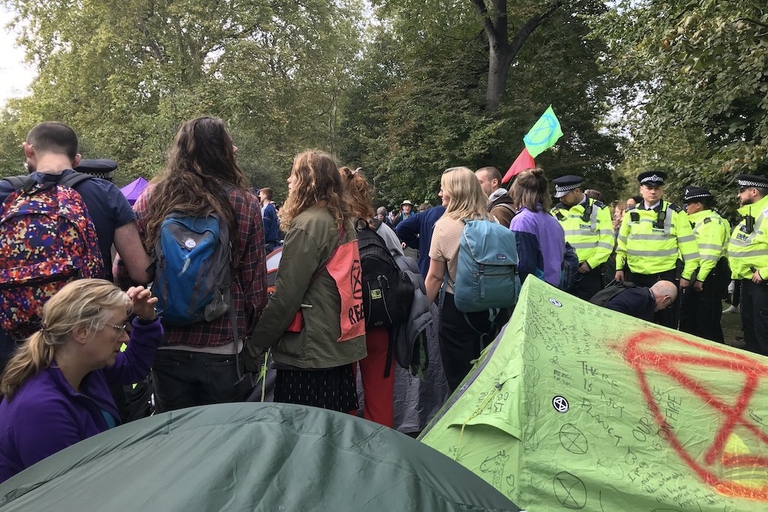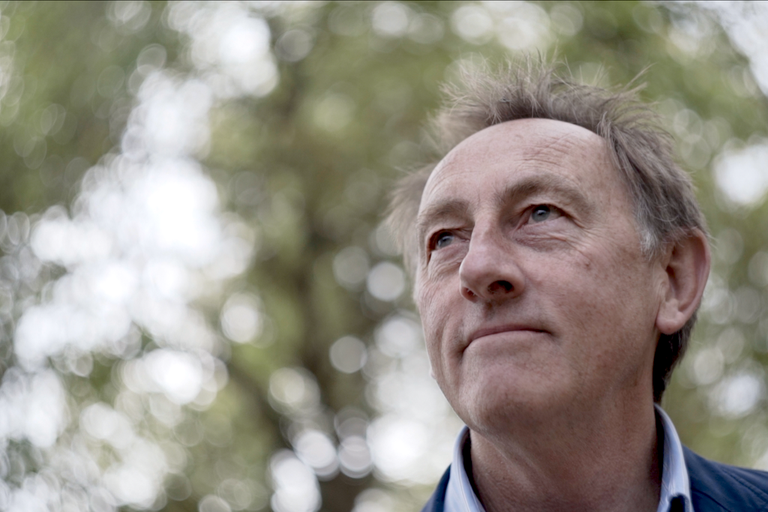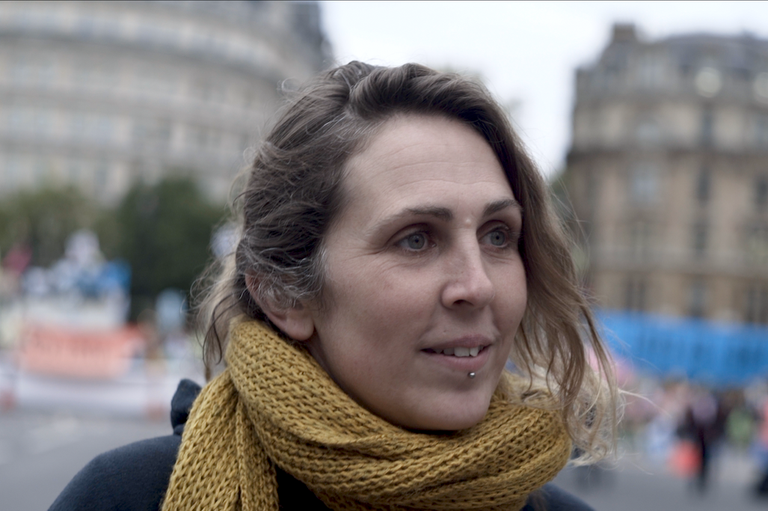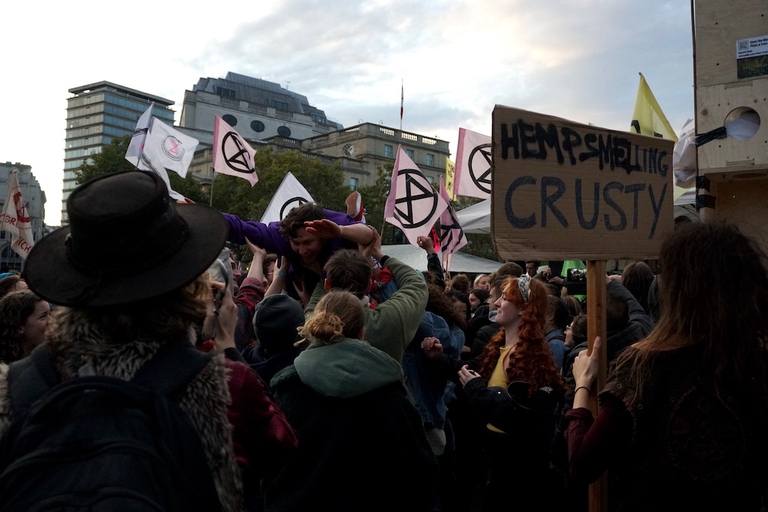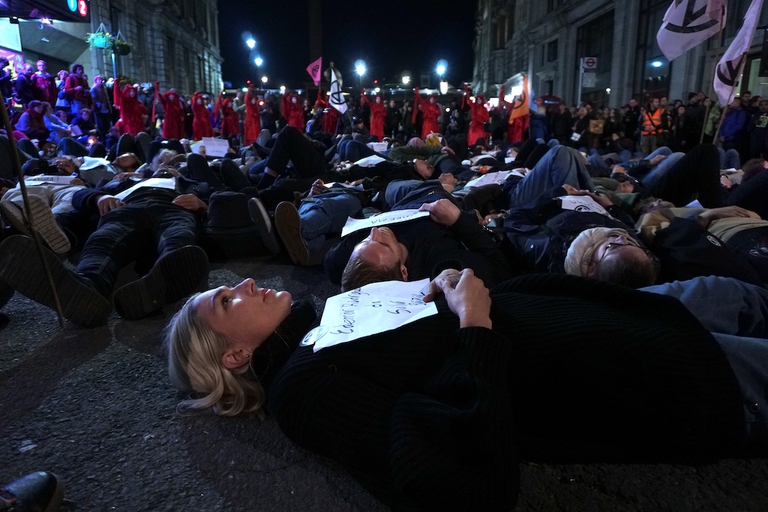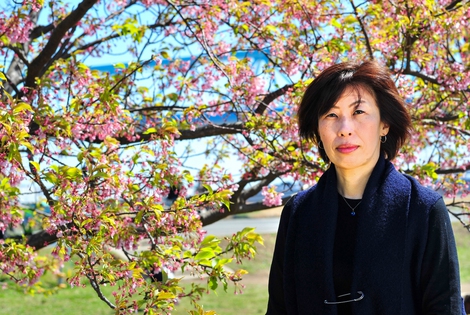
Three people putting the protection of the planet before themselves. Three powerful stories from Latin America, the deadliest region for environmental activists.
The International Rebellion took place in 60 cities around the world between 7 and 20 October 2019. Extinction Rebellion activists tell their stories from London, at the heart of the radical, nonviolent environmental movement.
A campsite under Lord Nelson’s gaze. Here, at the foot of Trafalgar Square’s iconic monument, in the heart of London, was Extinction Rebellion‘s operational headquarters during the International Rebellion, which involved 60 cities worldwide starting from 7 October. It lasted for two weeks in the British capital, the birthplace of the radical, nonviolent environmental movement known as XR, which succeeded in maintaining its hold on Trafalgar for the first seven days of the mobilisation until the protests were banned by the police the following week (a decision subsequently judged as unlawful by the UK’s High Court). Nonetheless, the mass occupation in the name of the climate and environment attracted 30,000 supporters in London alone, resulting in over 1,800 arrests and more than 20 million pounds (25 million US dollars) spent by the Metropolitan Police.
We met some of XR’s “rebels” who told us about the movement. Among them is Daze Aghaji, a 19-year-old history and politics student, national coordinator for regenerative cultures, which is one of Extinction Rebellion’s fundamental principles and which ties the health of the planet to that of its activists. Activists’ well-being is a prerequisite for their participation in civil disobedience actions, the logic goes. “I joined Extinction Rebellion because I was looking for a message that preached the urgency that I felt was needed when it comes to the climate crisis,” Aghaji explains. And there’s more. “I decided to participate in the EU elections in May because I didn’t see anyone who was like me in the EU Parliament and anyone who was talking about the climate crisis. I didn’t want (this issue) to be taken away by Brexit“. She didn’t become an MEP, but her experience went to show that “political literacy doesn’t come at an age,” in fact she was the youngest candidate in the elections. “When I was sixteen (and the Brexit referendum took place, ed.), I was fully capable of making a political decision, more than most adults I knew,” even though she wasn’t eligible to vote.
If Aghaji is one of the movement’s young faces, Rob Cooper represents those with more notches on their belt. Cornwall’s former Police Chief Superintendent is now an XR spokesperson. “I joined for the same reasons I joined the police: to protect the community,” he tells us. “When I’m walking around London and see the police I don’t feel it’s an ‘us’ and ‘them’ situation. One of the concerns I have is actually for my former colleagues. When you look at extreme weather events, it’s often the case that police officers, fire officers, and ambulance staff are going into situations that are life threatening. That’s 2019, so just imagine what it could be like in 2050“.
And behind the faces and voices of the movement are also those who have dedicated heart and soul to organising the October rebellion. Like Josie Holt who, after forming a local Extinction Rebellion group in North Devon, started working with the national chapter to become the People’s Assemblies Working Group Lead Link. “I was living in a bubble, in a permaculture build. When the IPCC report came out and I started to really become familiar with what was actually going on, it became quickly obvious that there wasn’t any such thing as a nice little bubble. I had to do something, it wasn’t enough anymore,” she tells us.
“You get to that point where, what are you going to do, are you going to just leave and hope somebody else sorts it out?,” says Holt on the backdrop of a Trafalgar Square animated with music and group activities, unperturbed by the drab weather. XR has presented itself as a space for collective action to deal with climate change for those who believe that petitions, marches and voting aren’t enough to bring about change, and that it’s time for people to put themselves on the line. “We’re a reasonable reaction and an almost predictable consequence of the situation that we’re in,” Holt emphasises.
The organisation has grown exponentially since the first London occupation in November 2018 and the one that took place last April, which propelled it to worldwide notoriety. It is governed by a complex organisational structure. “We work in a loosely holacratic system,” Holt explains, which “removes a top-down hierarchical structure“. There are large sections such as local or affinity groups (for example, XR youth, families, disabled rebels, scientists, etc.) that in turn oversee smaller groups who have a mandate to operate in relatively autonomy within a specific area, such as communications or well-being services. “It’s kind of like a spider’s web and it’s great because nobody’s in charge, so if you take one person out, say because they get arrested, it makes no difference”.
This collective force is unleashed following the principles of civil disobedience with the aim of achieving three specific demands. The first is that the UK government tells the truth about the climate emergency, and the second is reaching net zero emissions by 2025. The third is the creation of a citizen’s assembly made up of ordinary citizens representative of the population and selected by sortition, who after a process of education and consultation should offer recommendations to the government on the climate strategy to be adopted. “The government has shown time and time again that it isn’t able to deal with something of this magnitude,” Holt points out, because “politicians just look to the next general election,” in Cooper’s words.
“If something doesn’t happen soon, we’ll come back and there will be more protests,” says Cooper, and in fact more are planned during the 12 days running up to the UK general election on the 12th of December. “Members of the public are understanding the situation more and they realise that we need to do something”. But the wave of solidarity and enthusiasm (such as the almost one million pounds donated to one of the crowdfunding platforms used to finance the London October Rebellion) masks a big concern. That all this won’t be enough to change course, slow global warming down significantly and halt the sixth mass extinction. “Would I want my children to be part of XR?,” Holt asks herself. “No, I would hate for them to have to do that. I hope there’s no such thing as Extinction Rebellion when my younger children are old enough to take action. I hope that this is a distant memory and that they say ‘do you remember, mum, when you had to take to the streets, before everything changed?'”.
Siamo anche su WhatsApp. Segui il canale ufficiale LifeGate per restare aggiornata, aggiornato sulle ultime notizie e sulle nostre attività.
![]()
Quest'opera è distribuita con Licenza Creative Commons Attribuzione - Non commerciale - Non opere derivate 4.0 Internazionale.
Three people putting the protection of the planet before themselves. Three powerful stories from Latin America, the deadliest region for environmental activists.
Influential scientist, activist and author Vandana Shiva fights to protect biological and cultural diversity, and against GMOs.
Kimiko Hirata has blocked 13 new coal plants in Japan, but she hasn’t done it alone. The 2021 Goldman Prize winner tells us about her movement.
The Goldman Environmental Prize, the “green Nobel Prize”, is awarded annually to extraordinary activists fighting for the well-being of the planet.
We talk to Shaama Sandooyea, activist and marine biologist from Mauritius onboard Greenpeace’s Arctic Sunrise ship in the heart of the Indian Ocean.
Arrested for supporting farmers. The alarming detention of Disha Ravi, a 22-year-old Indian activist at the fore of the Fridays for Future movement.
Water defender Eugene Simonov’s mission is to protect rivers and their biodiversity along the borders of Russia, China and Mongolia.
Chibeze Ezekiel, winner of the 2020 Goldman Environmental Prize for Africa, is fighting to guide new generations towards a renewable future.
Leydy Pech, winner of the 2020 Goldman Environmental Prize for North America, is the beekeeper who defended Mexican Maya land against the agro-industry.
